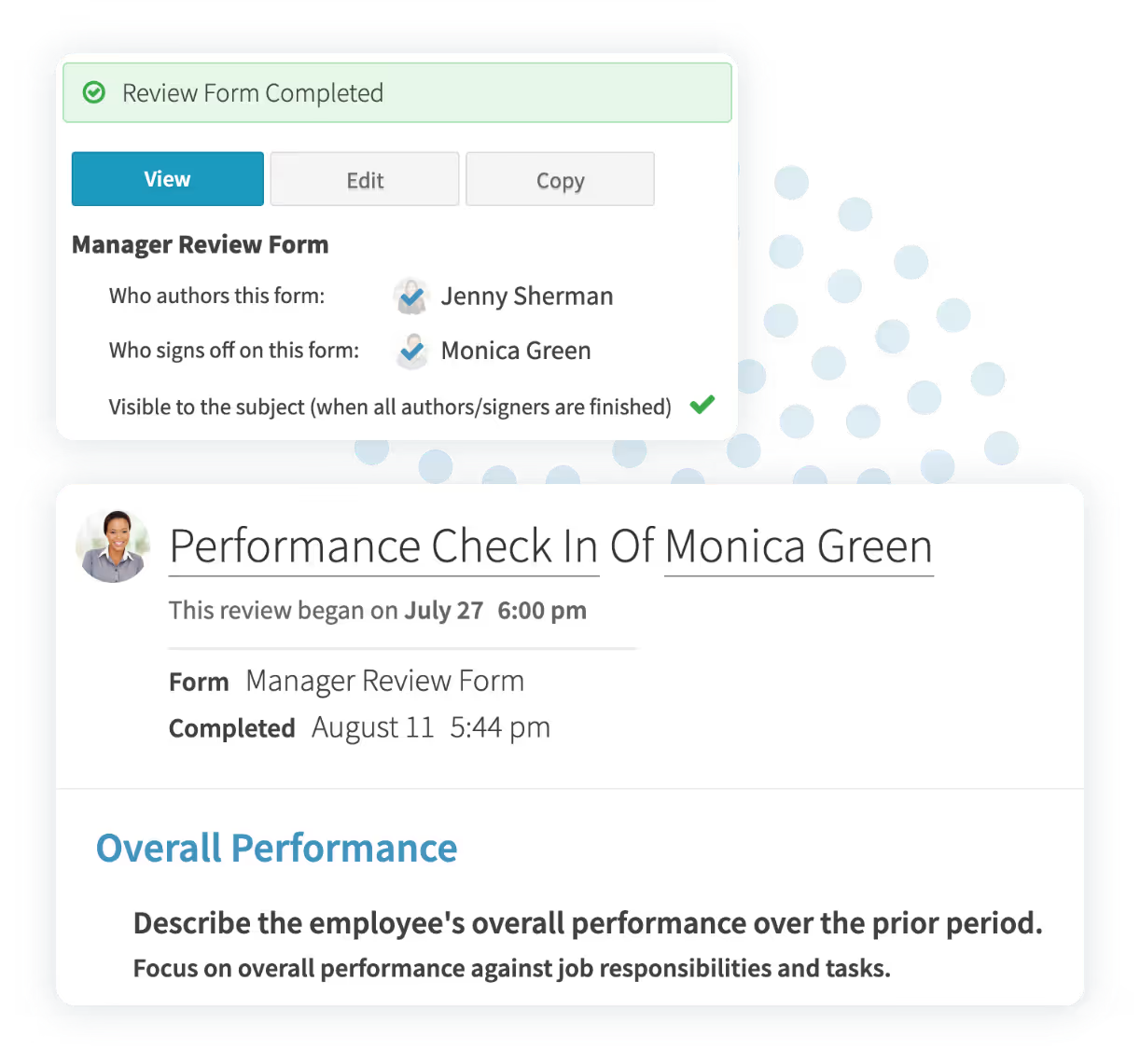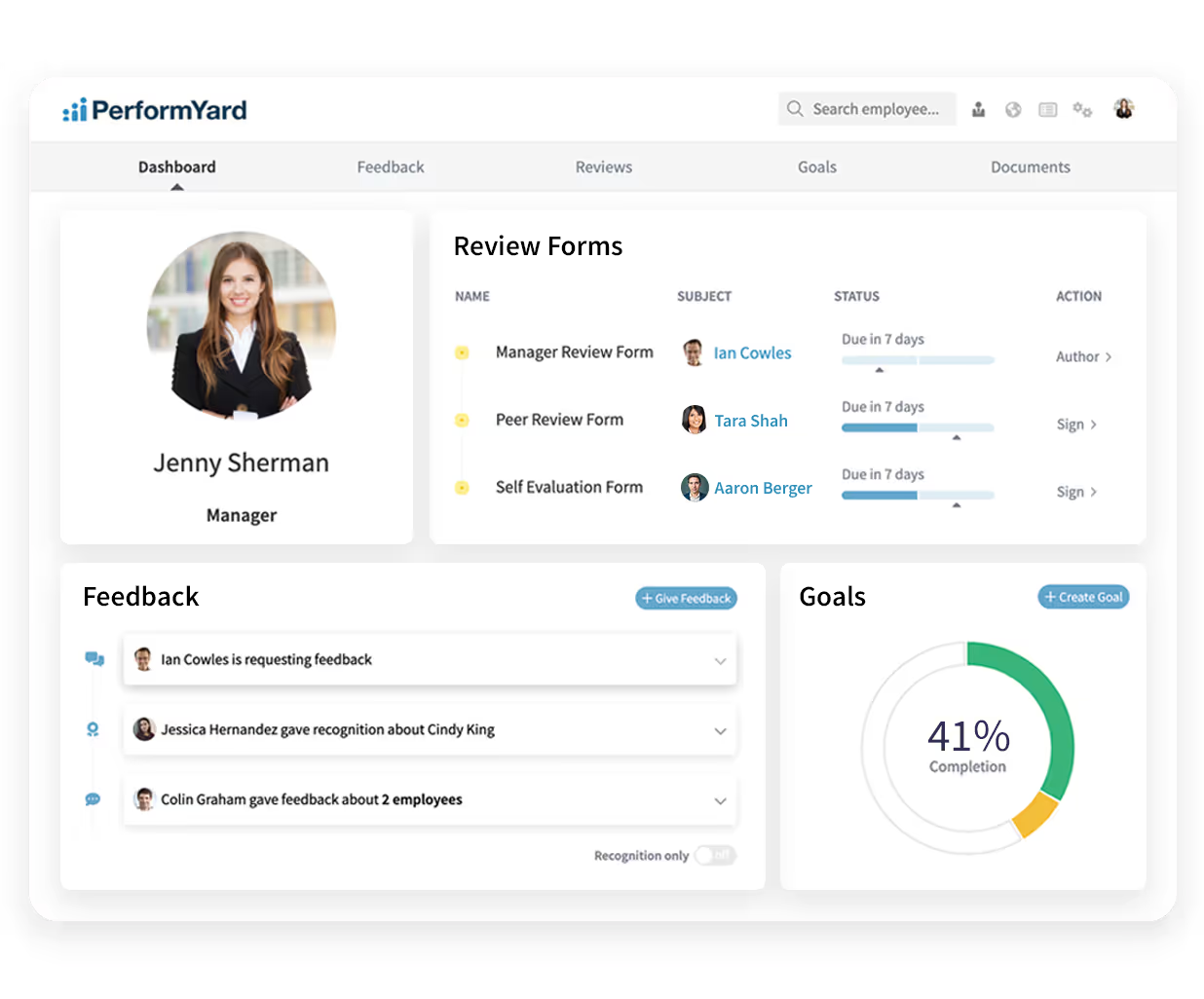The 2025 HR Guide to the Skip Level Meeting
Communication is extremely important in the workplace. There’s no doubt that regular meetings between employees and their direct reports are essential to success. It can increase productivity, engagement, retention, and trust.
But if you’re focusing all of your attention on facilitating traditional meetings between a manager and their direct team members, you’re missing a great opportunity for growth.
HR should also take the lead and implement skip level meetings as a critical part of the performance review cycle.
What Is a Skip Level Meeting?
A skip level meeting literally skips a level within the regular hierarchy of the organization. In most cases, it means an employee meets with their manager's manager, but a skip level meeting can take place between any employees at different levels within the organization who don't usually communicate with each other.
It's important to note that a skip level meeting isn't meant to mimic a performance review. Instead, it's an opportunity for different people in an organization to familiarize themselves with each other and what they do, and maybe spark some new ideas along the way.
How Frequently Should We Hold Skip Level Meetings?
Because skip level meetings aren’t meant to mimic a performance review, there’s no need for them to take place as frequently as a performance review. Managers are busy, as are employees. You don’t want to create a schedule of skip level meetings that your employees can’t manage within their existing calendar.
It’s a good rule of thumb to facilitate skip level meetings just one or two times a year. They don’t have to be long, either. Just one or two meetings that are 30 or 45 minutes long is all it takes to help employees and managers at different levels within the organization get to know each other better.
Why Are Skip Level Meetings Important?
Skip level meetings are important because they enable high-level managers to get a ground view of what’s going on in the organization. It enables them to talk about successes and failures directly with the people who are responsible for those successes and failures.
They aren’t just a good idea for high-level managers. You can also create a skip level meeting for employee growth. Employees can get a deeper understanding of the company and how it functions, but it also gives employees the opportunity to share their input and brainstorm ideas.
It may also help reduce turnover. In one HR study, it was found that 68% of employees would consider leaving their position if they did not feel as supported by senior employees.
» 10 Workplace Coaching Examples for Employee Development
The Benefits of Skip Level Meetings
Skip level meetings are important for high-level managers and regular employees because they come with a wide range of benefits that include:
- Building relationships with employees
- Gaining insight into how the organization is functioning
- Feedback on how your managers are managing
- Reduce employee turnover and boost morale
- Discover what is needed to improve company performance
Building relationships with employees
One of the biggest skip level meeting benefits is that it’s a great way to foster positive relationships between lower-level and upper-level team members. It enables everyone to put a face to positions and names that they see signed on emails, which can increase trust and create an environment of collaboration.
Gaining insight into how the organization is functioning
Upper-level managers can find it difficult to gain a sense of the day-to-day operations of the company. By meeting with those people who are involved in daily activities, high-level managers can gain insight into exactly how the organization is functioning on the ground level.
Employees are able to get a real sense of how the organization is functioning too. They can gain insight into why certain decisions were made and why things are set up the way they are, enabling them to see how their tasks and projects contribute to organizational success.
Feedback on how your managers are managing
A skip-level meeting is a great way to see the real-life impact your managers are having on their employees. It enables employees, who are normally only able to talk to their direct manager, to talk about the leadership they are (or aren’t) receiving.
Not only does it give employees a sounding board, but it also supports the growth of managers. It can highlight the nuances of dotted-line reporting, where employees have indirect reporting relationships that impact their overall experience.
Because of the direct input from employees, high-level managers can better support and lead regular managers, who in turn can better lead their direct reports.

Reduce employee turnover and boost morale
A high employee turnover rate can cost a company a lot of money, but it’s also a sign that employee morale is low. By giving all levels of your organization the opportunity to interact with each other, everyone is more likely to be engaged. By engaging your employees, not only in their work but also in conversations with each other, you could see an 18% decrease in staff turnover.
Discover what is needed to improve company performance
Upper-level managers set the tone and influence the operation of the organization, but it’s the ground-level employees who have the biggest impact on day-to-day operations. Having a skip level meeting is a great way for higher-ups to identify possible gaps so they can make high-level changes to improve company performance.
Skip Level Meeting: What Not to Do
Skip level meetings can be hugely beneficial to an organization, but that doesn’t mean they are automatically guaranteed to bring all the benefits we mentioned above. If they aren’t done right, they can be an ineffective waste of time. They can also degrade your company’s culture and negatively impact everything from engagement to productivity and even your bottom line.
Things not to do in a skip-level meeting include:
- Do not go behind managers’ backs
- Do not be secretive—tell employees what is happening
- Do not conduct skip level meetings only when there’s a problem
- Do not forget to follow through
Do not go behind managers’ backs
Skip level meetings can give employees a chance to talk about managerial issues, but that doesn’t mean they should be a secret. If managers find out that skip level meetings were conducted without their knowledge, trust is eroded, which can have a huge impact on engagement and productivity.
Managers should be notified that skip-level meetings are taking place so any potential outcomes of the meeting don’t come out of left field. It also gives them an opportunity for managers to provide their manager with input that can help them plan out the meeting.
Do not be secretive—tell employees what is happening
Skip level meetings shouldn’t come as a surprise to employees either. Skip level meetings that are sprung on employees at the last minute can cause a lot of anxiety. Not to mention, employees are less likely to get a lot out of the meeting if they aren’t able to prepare ahead of time.
Make sure employees are aware that skip level meetings are taking place, and make sure they have plenty of time to prepare ahead of their own meeting.
Do not conduct skip level meetings only when there’s a problem
Busy organizations only entertain the idea of skip level meetings when there’s a problem between an employee and their manager, but this defeats its purpose. One of the main benefits of a skip-level meeting is that it’s a way for higher-ups and employees to get to know each other and build positive relationships, but that’s not likely to happen if meetings only take place when there’s a problem to talk about.
That doesn’t mean you can’t talk about problems at all. It just means that skip-level meetings should be scheduled whether there’s a problem or not, which gives those in attendance the opportunity to talk about other things.
Do not forget to follow through
There are few things more frustrating than going to a meeting, feeling like you really contributed to that meeting, and then nothing happens.
Make sure both parties have a way to follow through with what was discussed in the meeting. That might mean scheduling a check-in meeting to hold everyone accountable or simply following up with an email. Whatever it is, just make sure the employee feels like their manager took what they talked about to heart and they are doing something about it.
How to Conduct a Skip-Level Meeting
So, how exactly do you avoid doing the wrong things so your team can enjoy all of the benefits that a skip level meeting has to offer?
It’s important to treat skip level meetings as part of the performance management cycle. The information that is gathered during these meetings can be used to inform other performance conversations, but only if the meeting is planned and executed the right way.
Here are the steps you should follow when conducting a skip level meeting:
- Inform the team and set the meetings
- In the meeting, set the tone
- Ask questions
- Ask for feedback
- Take notes
- Explain next steps
- Follow through
Inform the team and set the meetings
The entire team should know that skip level meetings are being planned, as well as exactly when each one is scheduled. If some members of the team aren’t participating, consider including an explanation for why. For example, you might mention that skip level meetings are only being scheduled for those who have been with the company for less than two years. Or, only half the meetings are being conducted now, and the other half will take place within the next six months.
It’s also a good idea to make sure participants are aware of the skip level meeting agenda. That way they can prepare their own questions or assemble the right information according to the topics that will be discussed.
In the meeting, set the tone
Meeting with a high-level boss can be intimidating for some employees, so it's important to set the tone as soon as they arrive. Managers should greet them warmly, share the reason for the skip level meeting, and mention how it isn't about solving a particular problem. They may also want to share how they will use any information that is exchanged during the meeting.
Basically, you’re trying to reduce feelings of anxiety and create a safe atmosphere where the employee feels comfortable enough to be open and honest.
Ask questions
Asking questions is a great way to break the ice and ensure the meeting stays on topic. Create a list of skip level meeting questions ahead of time so there are things to talk about that help the conversation flow freely.
If you're struggling to help managers find the right questions to ask, narrow in on whether the purpose of the meeting is to build rapport, gather information on a manager, or gather information about the organization as a whole. Then create a list of open-ended questions that will help drive discussion. It’s even better if you can provide these questions to employees ahead of the meeting. It gives them a chance to prepare so they don’t feel like they’re being put on the spot.
Ask for feedback
Managers should always open up the floor for employees to provide their feedback, whether it’s about their manager, the company, who they work with, or the projects they work on. It can provide you with insightful information that enables you to enact meaningful change, especially if you notice multiple employees are saying the same thing.
The biggest challenge for managers will be to resist the urge to problem-solve. This portion of the meeting is about managers showing each employee that they care by really listening to what they have to say. Problem solving can come later, if it becomes necessary.
Take notes
A skip level meeting can feel like it flies by. It’s easy for important things to slip through the cracks and be forgotten. That’s why it’s important to take notes. Make it easier for managers and employees to document the meeting and revisit covered topics with a dedicated platform, like PerformYard, that enables you to keep it all in one place.
It’s also not a bad idea to record the meeting, as long as both parties approve. It allows the manager and employee to revisit the conversation in its original context. Just make sure it isn’t shared with other parties unless it is explicitly stated before the meeting begins that the recording could be shared with others, like members of HR.
Explain next steps
It’s important to follow up on any issues that were mentioned. For example, the manager might send an email immediately after the meeting answering any questions that required a little research. A timeline can be included for finding answers to more complex questions, as well as timelines for the implementation of solutions to other issues.
Even if no explicit issues were discussed, high-level managers should still send out a quick follow-up email. It should thank the employee for meeting, as well as remind them of how the meetings are used and when they can expect the next skip level meeting.
Follow through
Arguably the most important step in the process is following through. Without the follow-through, employees won’t feel like they’re being listened to, and they will feel like skip level meetings are a waste of time. That can lead to decreased levels of engagement and productivity.
Share when action has been taken on what was talked about and be open to sharing if there have been some setbacks. Ask the employee for their help if they are able to help in any way. Being included is a great way to involve employees and make them feel like they are contributing in meaningful ways to the organization.
Questions to Asks in Skip Level Interviews
Not sure what skip-level meeting questions to ask? Here are a few to get you started, broken down by type, so you can zero in on the questions that will be most effective in your meetings:
- Building connection and rapport
- Information and feedback gathering on a manager
- Information and feedback gathering on the organization
Building connection and rapport
- What do you like most about your job?
- What's something new you've done outside of work?
- What's one new thing you wish you could try at work?
- What career interests or aspirations do you have?
- Where do you look for support if you experience a problem or roadblock?
Information and feedback gathering on a manager
- Does your manager recognize you for a job well done?
- What's the best part about working with your manager?
- What's the most challenging thing about working with your manager?
- What's an example of a time you think your manager managed well?
- How could your manager provide you with better support?
Information and feedback gathering on the organization
- What do you like most about working here?
- Is there something you think could be fixed, and how would you fix it?
- What organizational value do we follow closely, and which one do you think we need to do better at?
- If you could change one thing at our company, what would it be?
- Is there a recent leadership decision that made you feel worried or disappointed?
- What's something you have observed that I may not be able to see from my position in the company?
How to Use Software to Run Skip Level Interviews
Integrating skip level meetings into your regular performance routine can feel overwhelming, but it’s made much easier when you use the same platform to do it.
PerformYard allows you to create customized templates for every type of meeting—which includes skip level meetings. The tool makes it easy to schedule meetings, bring them into the regular performance review cycle when the time comes, and it gives managers a place to document each review directly into the PerformYard platform.

All the information about conducting a skip level meeting and following up after it is complete can be found in the same place, which makes it easy for HR to facilitate the process, managers to conduct the process, and employees to get the most out of the meeting.




.jpg)
